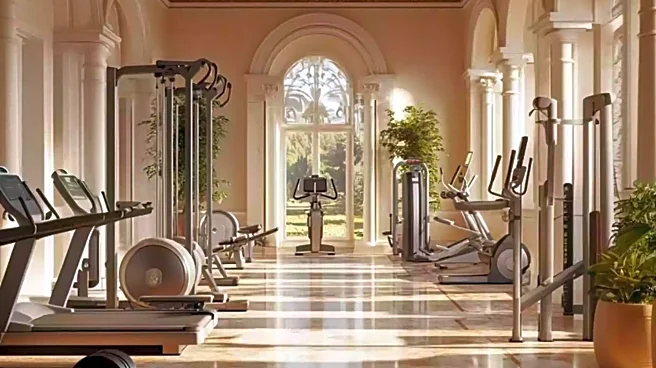What's Happening?
Renowned Italian architect brothers Gian Carlo and Matteo Primatesta are set to open a new luxury hotel, La Darbia in Chianti, in May 2026. The hotel is a transformation of an 11th-century hamlet located in the Tuscan countryside, between Panzano and Greve in Chianti. The 15-hectare estate features olive groves, meadows, and lavender fields, offering panoramic views of the Tuscan hills. The hotel will comprise 17 suites and apartments, each uniquely designed with features such as private gardens, kitchenettes, and steam baths. The interiors are crafted using local materials like pietra serena, terracotta, and travertine, emphasizing a balance between heritage and contemporary design. The restaurant, led by Executive Chef Matteo Monfrinotti, will focus on Tuscan cuisine using seasonal, locally sourced ingredients.
Why It's Important?
The opening of La Darbia in Chianti highlights the growing trend of luxury tourism in Tuscany, a region known for its rich cultural heritage and scenic landscapes. This development is significant for the local economy, as it is expected to attract high-end tourists and boost local businesses, including artisans and food producers. The hotel's emphasis on using local materials and sustainable practices reflects a broader movement towards eco-friendly tourism, which is increasingly important in preserving the cultural and environmental integrity of popular destinations. Additionally, the project showcases the potential for historical preservation through adaptive reuse, offering a model for similar initiatives in other regions.
What's Next?
As the opening date approaches, the hotel will likely begin marketing efforts to attract international tourists, particularly those interested in luxury and cultural experiences. The success of La Darbia in Chianti could inspire further investments in similar projects across Tuscany, potentially leading to increased competition among luxury hotels in the region. Local stakeholders, including government officials and tourism boards, may collaborate to promote Tuscany as a premier destination for sustainable and culturally rich tourism. The hotel's focus on local cuisine and materials may also encourage other businesses to adopt similar practices, contributing to the region's economic and cultural sustainability.
Beyond the Headlines
The transformation of the historic hamlet into a luxury hotel raises questions about the balance between tourism development and cultural preservation. While the project aims to respect the environment and Tuscan culture, it also highlights the challenges of maintaining authenticity in the face of commercial interests. The involvement of local artisans and the use of traditional materials suggest a commitment to preserving cultural heritage, but ongoing dialogue with local communities will be crucial to ensure that development aligns with their values and needs. This project may serve as a case study for other regions grappling with similar issues.











